Worldwide Breast Cancer — Know Your Lemons campaign
- Exhibited by
- Joe Burnett
- Added
- October 10, 2019
- Medium of Communication
- Social media, online, app.
- Target Audience
- Women
- Type of Charity
- Health
- Country of Origin
- USA
- Date of first appearance
- 2017
SOFII’s view
This is a fantastic campaign because it’s so simple. When it comes to health matters it can sometimes be difficult to discuss sensitive or ‘embarrassing’ parts of the body and conditions. Worldwide Breast Cancer struck gold when they came up with a lemon metaphor: it’s easily understood and funny yet it gets straight to the heart of the issue. With a brilliant use of social media, a well-designed app and a clear message, the Know Your Lemons campaign has since gone from strength to strength and we expect that to continue for many years to come.
Summary / objectives
Worldwide Breast Cancer (WBC) is a US nonprofit with a focus on global education to empower women to identify symptoms of breast cancer and manage their disease better. WBC is dedicated to relieving the burden of breast cancer on patients, their families, and society as a whole through designing disease information in a way that communicates on a universal level—overcoming taboo, fear and literacy issues.
To encourage women to check their breasts more regularly, spot physical warning signs and ultimately help save lives, WBC launched its Know Your Lemons Campaign with full force in February 2017 after a Facebook post from Erin Smith Chieze, a breast cancer survivor went viral.
Background
Every minute somewhere in the world a woman dies from breast cancer. Yet one-third of cancer deaths worldwide could be avoided through education and screening but sadly just 4 per cent of women know the signs of breast cancer. This is a problem to do with how we talk about breast health, which is mostly spoken through pink ribbon symbols and general messages of ‘look for changes’ that don't say much.
When breast cancer is found in the earliest stage, the survival rate is nearly 100 per cent. But when it’s found in the latest stage, there is no surviving it. This is why being able to spot a symptom of breast cancer at the beginning is so important, and why screening (where available) is key to early detection and lives being saved.
The difficulty with breast cancer is that, well, it’s about breasts and it’s about cancer. Two topics that on their own aren't easy to have in public. Combine them, and it’s even more difficult to talk about, let alone display for all to see.
So the way around this problem has been to describe things not through images, but by using text, a lot of text. This eliminates a large section of the population right away: either because they cannot read it or they don't have the time to read it. So, not a lot of education happening there.
The other option is to talk about it. Talking about breasts openly isn’t a common thing in many parts of the world and is difficult in many situations, mostly because of its close association to sex. That restricts it to just being discussed in very specific settings, with specific people at specific times.
Talking about cancer is also a subject often avoided. In some places, simply saying it out loud is seen as an invitation for the disease to find you. Which is ridiculous, because talking about cancer doesn't mean you will get cancer, right? (knock on wood)
So how do you educate a diverse global population without words about a topic they don’t want to discuss and without embarrassing them? This was the question Worldwide Breast Cancer wanted to answer and they came up with the Know Your Lemons campaign.
Worldwide Breast Cancer used a stand-in for the breast that can bypass all of these barriers in a friendly, familiar and engaging way. They created a new way of looking at the breast that doesn’t get sexual, gory or censored. A lemon doesn’t have an age, gender or ethnicity so it can represent anyone. And that’s the genius behind the lemons and why they have worked in places as diverse as San Francisco and Saudi Arabia.
Equally, the power of social media is undeniable.
These days, it’s hard to find someone you know who doesn’t own at least one social media account. As a matter of fact, 90 per cent of young adults aged 18 to 29 use social media (compared to just 35 per cent of those over 65 years old). And, a third of millennials say social media is one of their preferred channels for communicating with businesses.
A compelling social media campaign has the power to engage, inspire, and boost brand awareness. So it was crucial for Worldwide Breast Cancer to make the most of social media platforms to maximise their impact.
Merits
By creating a catchy campaign name and concept, the #KnowYourLemons Worldwide Breast Cancer campaign gave thousands of women the critical information needed to spot lesser known warning signs and share their personal tales with a thriving community.
The charity set-up a standalone member’s page on Facebook where people could read regular news updates, donate to the cause, and take part in active conversations about the subject. The most genius element of this particular campaign is its accessibility.
Today there is an online shop selling a raft of Know Your Lemons-themed goodies people can buy to support Wordlwide Breast Cancer and the organisation has even created an app to help women learn to self-screen for breast cancer, book a mammogram and access crucial advice.
Know Your Lemons brainchild and director of Worldwide Breast Cancer, Corrine Ellsworth Beaumont, had this to say:
‘It doesn't matter if you have a high literacy level; if you can't read you can still look at this image and save a life.’
By taking a striking visual approach, the organisation was able to spread awareness at a rate that wouldn't have been achievable with a hashtag or strap-line alone. No matter who you are or which language you speak, the message here is easily understood.
Results
Using a lighthearted campaign concept to convey a serious subject and giving people a platform on which to share their thoughts and stories resonated with the audience and led to Worldwide Breast Cancer exceeding their fundraising target by 317 per cent on Just Giving alone.
Since 2014, Worldwide Breast Cancer has educated over 500 million people around the world. The Know Your Lemons campaign is in over twenty languages and used in over 90 countries. People have reached out to WBC saying that these lemons helped them to get diagnosed in a way they wouldn’t have otherwise.
The Know Your Lemons breast health app
This superbly-designed app is a means to get confident with self-exams and book mammograms with ease. 200 million people already know the twelve signs of breast cancer, and now with the app users can:
- Finally learn how to do a self-exam the right way with a virtual exam coach.
- Book a mammogram with an FDA-certified centre in seconds.
- Know what to expect for their mammogram, ultrasound and more.
- Customise their own screening plan based on their personal risk.
- Schedule self-exams with the period tracker for best results.
- Learn the twelve symptoms of breast cancer and note any changes.
- Be guided step-by-step on how to investigate a symptom.
Worldwide Breast Cancer, led by and for women, is building on its successful award-winning design and friendly lemon visuals to create an app for users’ future breast health, backed by a decade of research.
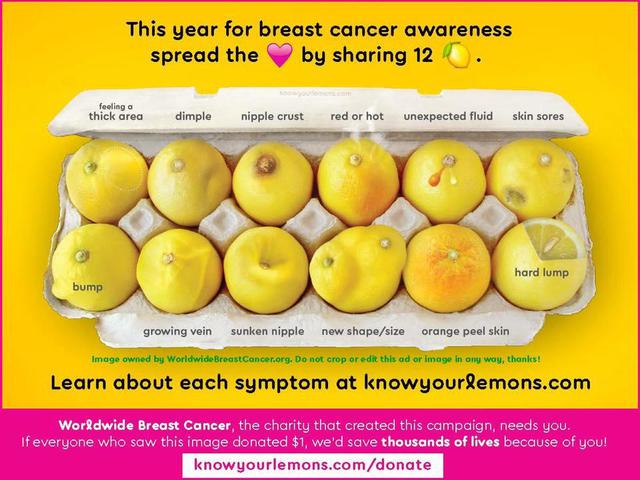
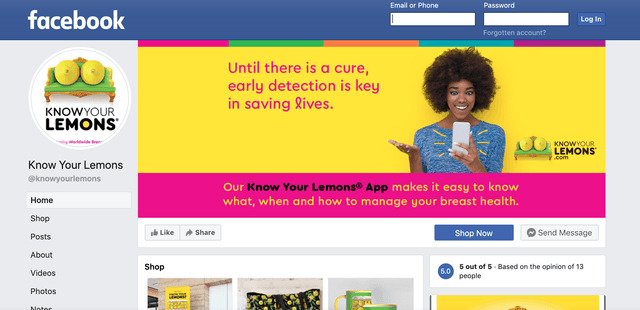 View original image
View original image
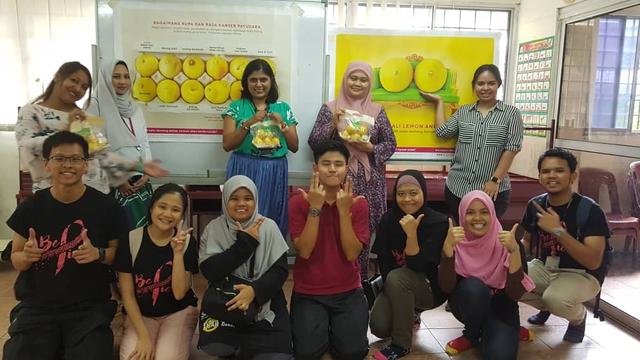
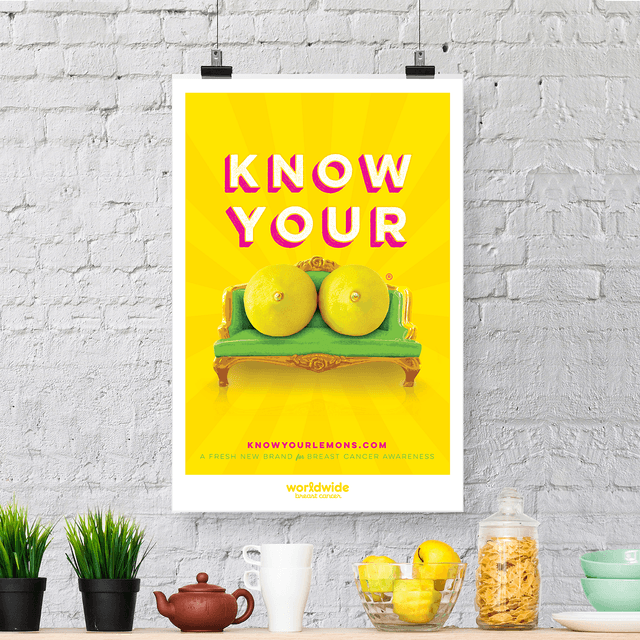
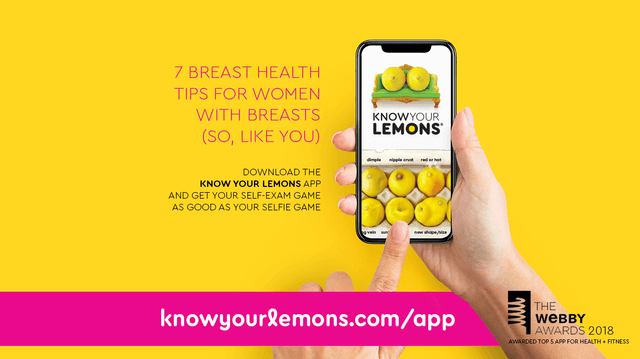
Also in Categories
-

















